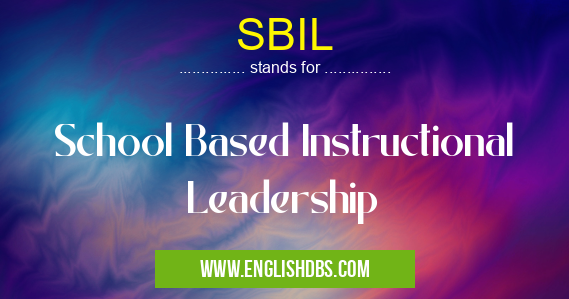What does SBIL mean in LEADERSHIP
SBIL stands for School Based Instructional Leadership. It is a comprehensive approach to school improvement that focuses on enhancing the pedagogical leadership capacity of school principals and other school leaders. SBIL aims to create a collaborative school environment where teachers and administrators work together to improve student learning outcomes.

SBIL meaning in Leadership in Community
SBIL mostly used in an acronym Leadership in Category Community that means School Based Instructional Leadership
Shorthand: SBIL,
Full Form: School Based Instructional Leadership
For more information of "School Based Instructional Leadership", see the section below.
» Community » Leadership
Key Elements of SBIL
- Instructional Focus: SBIL prioritizes the improvement of teaching and learning practices within the school.
- Collaborative Leadership: SBIL fosters a culture of teamwork and shared decision-making, with principals and teachers working together to create a positive learning environment.
- Data-Driven Decision Making: SBIL uses data to inform instructional decisions and track student progress.
- Professional Development: SBIL provides opportunities for school leaders and teachers to engage in professional development to enhance their skills and knowledge.
- Student Engagement: SBIL emphasizes the importance of student engagement and fostering a sense of belonging in the school community.
Benefits of SBIL
- Improved student achievement
- Enhanced teacher collaboration
- Increased principal leadership capacity
- Improved school climate
- Increased student engagement
Essential Questions and Answers on School Based Instructional Leadership in "COMMUNITY»LEADERSHIP"
What is School Based Instructional Leadership (SBIL)?
SBIL is a leadership model that empowers teachers and administrators within a school to collaboratively improve teaching and learning outcomes. It focuses on creating a shared vision for instruction, developing teacher capacity, and fostering a culture of continuous improvement.
Why is SBIL important?
SBIL is crucial because it:
- Empowers teachers to take ownership of their instruction and drive school improvement.
- Fosters collaboration and shared decision-making among educators.
- Creates a data-driven culture that supports evidence-based decision-making.
- Improves student engagement and academic achievement.
What are the key components of SBIL?
Key components of SBIL include:
- Shared instructional vision
- Teacher leadership
- Data-driven decision-making
- Professional development
- Continuous improvement
How is SBIL implemented?
SBIL implementation typically involves:
- Establishing a school-wide leadership team
- Developing a shared instructional vision
- Providing training and support for teacher leaders
- Implementing data collection and analysis systems
- Facilitating ongoing collaboration and reflection
What are the benefits of SBIL?
SBIL offers numerous benefits, including:
- Improved student achievement
- Enhanced teacher collaboration
- Increased teacher leadership
- Data-driven decision-making
- Sustainable school improvement
How can I learn more about SBIL?
To learn more about SBIL, you can:
- Visit the National Association of Secondary School Principals (NASSP) website: https://www.nassp.org/
- Read research and articles on SBIL
- Attend conferences and workshops on school leadership
- Connect with other educators who are implementing SBIL
Final Words: SBIL is a transformative approach to school leadership that empowers school leaders to create a supportive and engaging learning environment for all students. By focusing on instructional improvement, collaborative leadership, and professional development, SBIL helps schools to achieve their full potential and foster student success.
